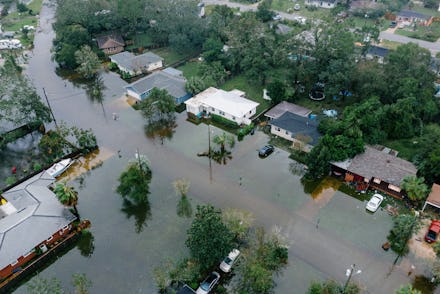Climate change is already causing a housing crisis in America

In 2017, Ben Shapiro, suffering from a flare-up of his terminal case of Galaxy Brain Disease, briefly entertained the idea that water levels might rise significantly thanks to climate change and could push people living in coastal cities out of their homes. Shapiro, luckily, had a solution: "You think people aren't just going to sell their homes and move?"
As it turns out, Shapiro greatly overestimated the free market's ability to generate demand for houses that are projected to go from beachfront to seafloor property. According to a study published Monday by the National Bureau for Economic Research (NBER), sales of coastal homes in Florida have been dropping since 2013, and prices have started to decline in the once desirable homes. The findings could be a harbinger for what is to come across the country, as homes located in areas at a high risk of being affected by climate change may lose value and be difficult to sell.
According to the researchers, who examined more than 1.4 million home sales that occurred in Florida over the last 20 years, these changes happened in plain sight but largely went unnoticed thanks to the housing bubble bursting in 2008. At the time, the value of houses dropped across the board, as did sales of homes. But as the economy started to recover and the market returned to something closer to normal, there has been a noteworthy divergence in the sales of homes located in low-risk areas and those smack dab in the middle of high-risk regions. Researchers found the split started in 2013. As houses in low-risk areas continued their upward trend in sales, homes in high-risk regions — particularly along Florida's coast, where sea levels are already rising at a surprisingly rapid rate — started to decline again despite a stronger housing market. According to the study, the volume of sales in these flood-prone regions declined by between 16 and 20 percent between 2013 and 2018 relative to homes in safer areas.
As sales in these areas have stagnated, prices are starting to drop as homeowners have become more anxious about getting out of their homes before seawater finds its way in. The researchers found that in the last two years, the prices of homes in at-risk regions of coastal Florida have dropped by five percent. That may suggest that not only has the demand for these houses been on the decline but that owners are becoming more motivated to sell.
These trends are likely to continue as climate change becomes an even clearer and more present threat than it already is. In 2017, real estate firm Zillow published research that projected as many as one in eight of all homes in Florida could end up underwater by the year 2100. A year later, the Union of Concerned Scientists published a study that suggested as many as 64,000 Florida homes could experience frequent flooding caused by rising sea levels by 2045, and as many as one million homes could be in jeopardy of the same fate by the end of the century.
Despite these risks and the apparent drop in demand for homes that could be at risk of getting swept away by rising tides within the next 100 years, the Florida housing market seems to be unconvinced of the risks. A report published by The Guardian last year found that developers are still building houses and condos in regions projected to be hardest hit by rising sea levels. Even the researchers behind the NBER study noted that lender behavior has not changed and rates of loan denial and scrutinization for homes in high-risk areas remain essentially the same.
While the study focused on Florida, odds are this will become a national trend as climate change continues to make living in some regions untenable. If you're looking to get out of your at-risk property before sea levels start to rise or wildfires threaten to engulf it in flames, maybe give Ben Shapiro a call and see if he'll take it off your hands.